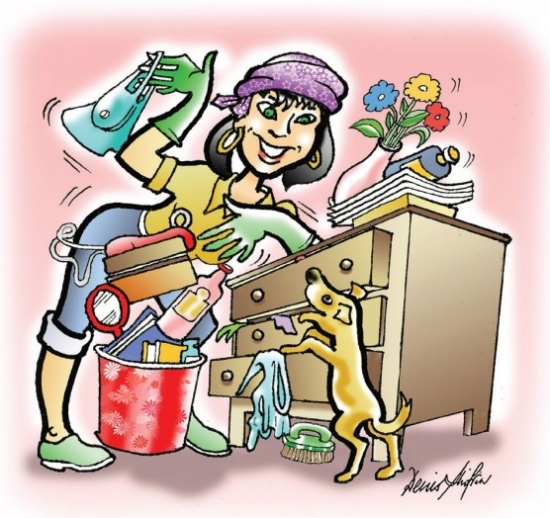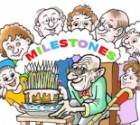
Illustration by Denis Shifrin
Opening up cupboards that you’ve neglected for ages, or emptying the drawers of your desk can seem daunting, but it’s often gratifying.
Despite the current climate of political and financial uncertainty, the news these days isn’t all doom and gloom. Happiness, in fact, is making headlines. Neuroscientists are revealing how it affects our brains. Economists are starting to measure it. British Prime Minister David Cameron is mooting the idea of an index to monitor it. And even the UK's Chief Rabbi is advising the general public how to achieve it. With all this talk of optimism, perhaps it’s no surprise that last February witnessed the launch of World Happy Day.
The day was initiated in the UK by the newly-formed Action for Happiness, which describes itself as “a movement for positive social change”. Unaffiliated to any political or religious group, it aims to motivate people from all walks of life – from policy-makers to parents, employers and entrepreneurs – to do things that enhance happiness and alleviate misery.
Of the ten keys to happier living promoted by Action for Happiness, it’s striking that many reflect Jewish values and practices. Take gratitude, for instance. Happiness gurus recommend keeping a gratitude journal to record appreciation for things that embellish our lives or lift our spirits. How similar is this idea to the concept of reciting “brachot” (blessings) for everyday experiences such as waking up or eating? Getting involved with a local project or helping a neighbor – helping to build a “kehilla” (community) – benefit individuals as well as society as a whole. Evidence suggests that even simple actions that promote connection such as smiling at a stranger in the street can make you both happier.
As a life coach and professional declutterer, I’m inspired by two further claims from the happiness studies. Firstly, the notion that happiness can be learned; in other words, you can train yourself to become happier by developing positive routines. Secondly, you don’t need to make radical changes in your life in order to spread happiness – even small steps can make a difference to you and the people around you.
Decluttering, I’m convinced, can make a huge impact on happiness. Whether your hallway is crammed with bicycles and buggies or your bookshelves are groaning with books and papers, chances are that making some effort to reduce the physical mess around you will help you feel more in control of your life. I’m not suggesting that clearing out all your wardrobes can solve all your emotional problems – but I would invite anyone who’s feeling “stuck” or overwhelmed to give it a try.
Locate your clutter and review what you own. Opening up cupboards that you’ve neglected for ages or emptying the drawers of your desk can seem daunting. It’s often gratifying, however, to discover things that you’d lost or forgotten that you’d bought. Taking stock of material possessions – taking time to notice and appreciate your belongings – can also raise bigger questions: what’s important in your life right now? What are you ready to let go?
Rabbi Hillel knew a thing or two about clutter, even 2000 years ago when he proclaimed: "The more possessions, the more worries." In today’s consumer society there’s no doubt that most of us buy more than we need. Homes become cluttered with bulk-buy bargains, impulse purchases, souvenirs and ubiquitous objects that we keep “just in case”. Not to mention gifts and mementos – collectively known as “tchotchkes”. And while advertisers continue to laud the benefits of retail therapy, it’s obvious that surplus stuff can get in the way, both literally and metaphorically. The unworn clothes in your wardrobe or unfiled papers on your dining-room table are an unsightly reminder of things you haven’t yet tackled; they also reinforce procrastination by draining energy and creativity.
Finding meaningful ways to reduce, reuse, recycle and redistribute your material belongings can revitalise your home and help you to focus on what really matters. Decluttering isn’t a substitute for therapy, but the results can be therapeutic, not least because it draws attention to beliefs and assumptions that no longer serve you. Becoming mindful of what you buy and what you choose to display or wear can lead to greater awareness of how you express yourself in other ways. So, liberating your space can help to liberate your mind!
If you’re eager to enhance both personal and social wellbeing, consider what you can declutter from your home and your life. And maybe next World Happy Day should adopt that slogan from the Ethics of the Fathers: “Who is rich? One who is happy with his lot.”
Juliet Landau-Pope is a life coach and professional declutterer who lives in London.
Reprinted by courtesy of the Jewish News, London.
 Milestones 168
Milestones 168 “Be our Guest” at Beauty and the Beast
“Be our Guest” at Beauty and the Beast Advertisers List
Advertisers List Do you need a new-style senior citizen card?
Do you need a new-style senior citizen card? Tidbits. Comments. Oddities.
Tidbits. Comments. Oddities.-1451978893.jpg) Connecting
Connecting Juliet Landau-Pope
Juliet Landau-Pope